When we think about search engines, Google is the first name that comes to mind. It dominates the search market, handling over 90% of global searches. But does that mean it’s the only viable option? Not at all.
There are several reasons why people seek alternatives to Google. Some are concerned about privacy, others want unbiased search results, and some are simply looking for fresh perspectives. Google’s algorithms often personalize searches, meaning users may be trapped in a bubble of filtered content. Additionally, concerns over data collection and targeted advertising have driven many to explore alternative search engines that align with their values and needs.
In this article, we’ll explore the best search engine alternatives to Google, highlighting their strengths, weaknesses, and why you might want to consider using them.
Table of Contents
1. DuckDuckGo: Privacy Without Compromise
Overview
Since its inception in 2008, DuckDuckGo (DDG) has become synonymous with privacy-focused searching. Built on the promise of “no tracking, ever,” DuckDuckGo avoids storing personal data like your IP address, search history, or cookies. This commitment to privacy ensures that every user gets the same, unbiased search results—free from the influence of personalized ads.
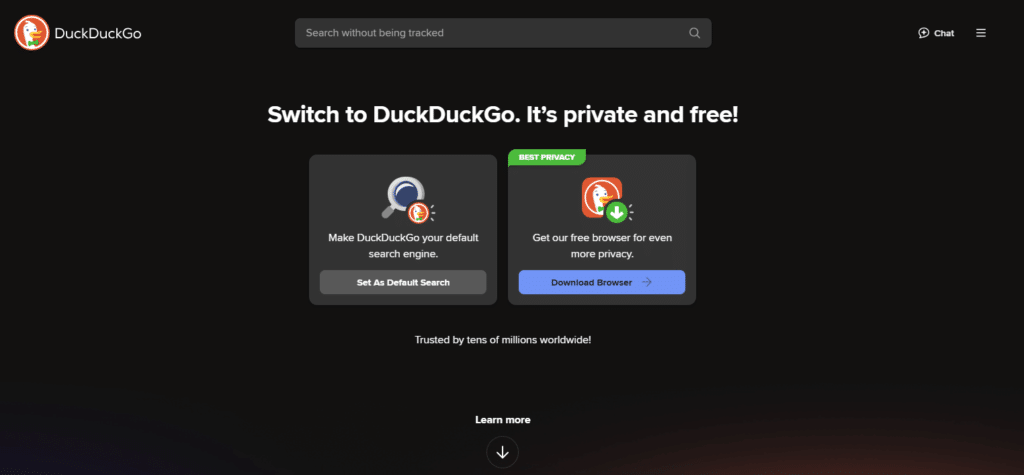
Key Features
- Anonymous Searching: DuckDuckGo does not collect or share your personal information, meaning there’s no tracking or cookie storage.
- Unbiased Results: By not tailoring results based on your past behavior, it helps you avoid the “filter bubble” that often limits your worldview.
- !Bang Commands: These shortcuts (for example, !w for Wikipedia or !a for Amazon) allow users to quickly search within a specific website, making your browsing experience more efficient.
- Encrypted Connections: With HTTPS by default, every search is conducted securely, protecting you from potential data breaches.
Pros and Cons
| Pros | Cons |
| No personal data tracking | Limited personalization compared to Google |
| Clean, ad-free interface | Sometimes less relevant results in niche queries |
| Strong commitment to privacy | Relies partially on Bing for sourcing some results |
Best For
DuckDuckGo is best for individuals who value their privacy and seek unbiased search results. It is ideal for journalists, privacy advocates, and anyone who is tired of targeted advertising.
2. Bing: Microsoft’s Feature-Packed Underdog
Overview
Often overshadowed by Google’s global presence, Bing—Microsoft’s search engine—offers a surprisingly robust and feature-rich alternative. Particularly popular among Windows users, Bing continuously evolves to integrate multimedia search, rewards, and deep integration with Microsoft’s ecosystem.
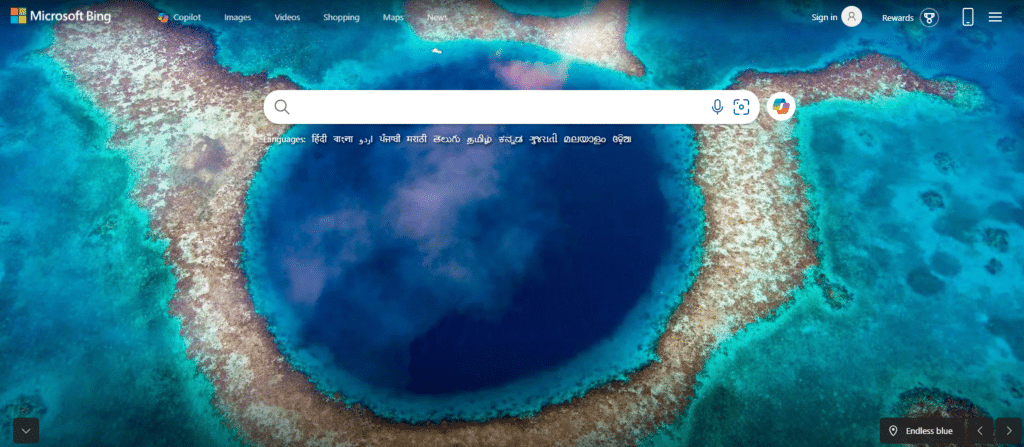
Key Features
- Microsoft Rewards: Earn points with every search that can be redeemed for gift cards, Xbox credits, or even charitable donations. This loyalty program transforms your everyday searches into tangible rewards.
- Visual Search Tools: With superior video previews, 360-degree image views, and a highly effective reverse image search, Bing excels in multimedia search.
- Deep Integration: Seamless integration with Windows, Outlook, and Office 365 provides a cohesive experience for users deeply embedded in the Microsoft environment.
- Enhanced Mobile Experience: Bing’s mobile app is designed for speed and ease-of-use, ensuring quality search experiences on-the-go.
Pros and Cons
| Pros | Cons |
| Rewards program that incentivizes searches | Collects user data for ad targeting |
| Excellent visual and multimedia search tools | Lags behind Google in natural language processing |
| Seamless integration with Microsoft products | Fewer third-party integrations compared to Google |
Best For
Bing is a top choice for Microsoft users, media researchers, and anyone looking to earn rewards through daily searches. Its unique multimedia capabilities and loyalty program set it apart from other alternatives.
3. Brave Search: The Independent Innovator
Overview
Emerging from the team behind the privacy-focused Brave browser, Brave Search is carving a niche for itself as an independent, tracker-free search engine. Unlike many privacy-first alternatives that still rely on external data sources, Brave Search builds and maintains its own index—offering a fresh, unfiltered perspective on the web.
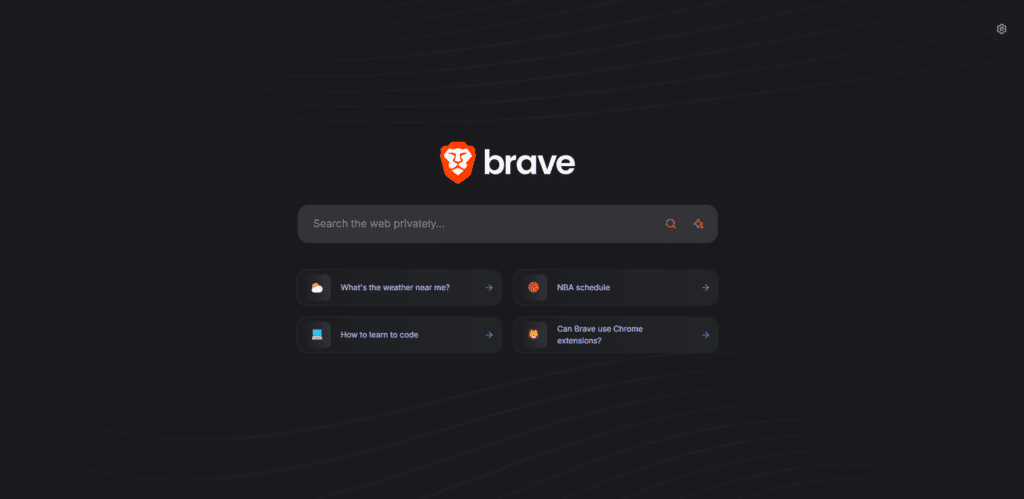
Key Features
- Independent Index: Brave Search’s crawler builds its own database, ensuring independence from Google or Bing, and reducing reliance on third-party sources.
- Privacy-Centric: With no tracking or profiling, Brave Search ensures that your queries remain private.
- Ad-Free Option: Users can opt for a paid version that removes all ads, creating a cleaner search environment.
- Community-Driven Ranking: Users can participate in refining search results by upvoting or downvoting, making the engine’s algorithms more transparent and adaptable.
Pros and Cons
| Pros | Cons |
| Fully independent search index | Results can sometimes be less refined in early stages |
| Strong privacy focus with no tracking or profiling | Lacks the extensive feature set of older search engines |
| Transparent community-driven ranking system | Smaller market share means the index is still growing |
Best For
Brave Search is perfect for tech-savvy users who demand independence from Big Tech and value privacy above all else. Its growing index and innovative community features make it a great choice for those seeking a unique search experience.
4. Startpage: Google’s Results, Anonymized
Overview
Startpage provides the best of both worlds: you get the high-quality, accurate results of Google without the invasive tracking. By acting as an intermediary, Startpage fetches Google’s results while stripping away all user-identifying data, thus preserving your privacy.
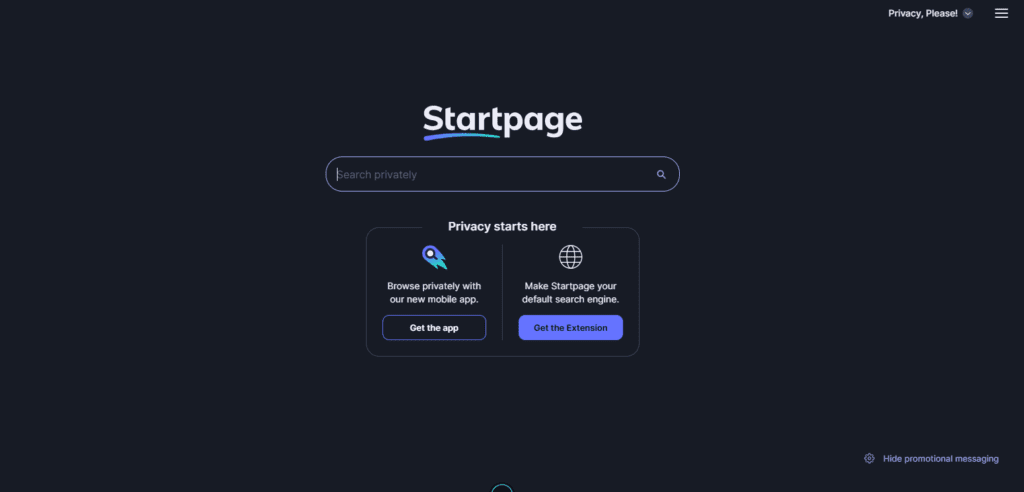
Key Features
- Google-Powered Accuracy: Enjoy Google’s search prowess without sacrificing your privacy, as Startpage delivers untracked, anonymized results.
- Anonymous View: Allows you to browse websites anonymously, keeping your IP address hidden.
- No Logs Policy: Startpage deletes search data within 14 days, ensuring that your information isn’t stored indefinitely.
- Simple, Clean Interface: The user-friendly design makes it easy to navigate without the distraction of excessive ads or clutter.
Pros and Cons
| Pros | Cons |
| High-quality results powered by Google | Slightly slower response times due to privacy layers |
| Enhanced privacy through anonymization | Interface is more basic compared to modern search engines |
| No targeted ads | Heavily reliant on Google’s indexing |
Best For
Startpage is an excellent choice for users who love Google’s accuracy but are wary of the privacy implications. It is ideal for those who want a seamless search experience without leaving a digital footprint.
5. Ecosia: The Search Engine That Plants Trees
Overview
Ecosia turns everyday searches into opportunities for environmental conservation. By allocating up to 80% of its ad revenue to reforestation projects, Ecosia transforms your search activity into a force for positive change. Since its launch in 2009, Ecosia has helped plant millions of trees around the globe, making it a favorite for eco-conscious users.
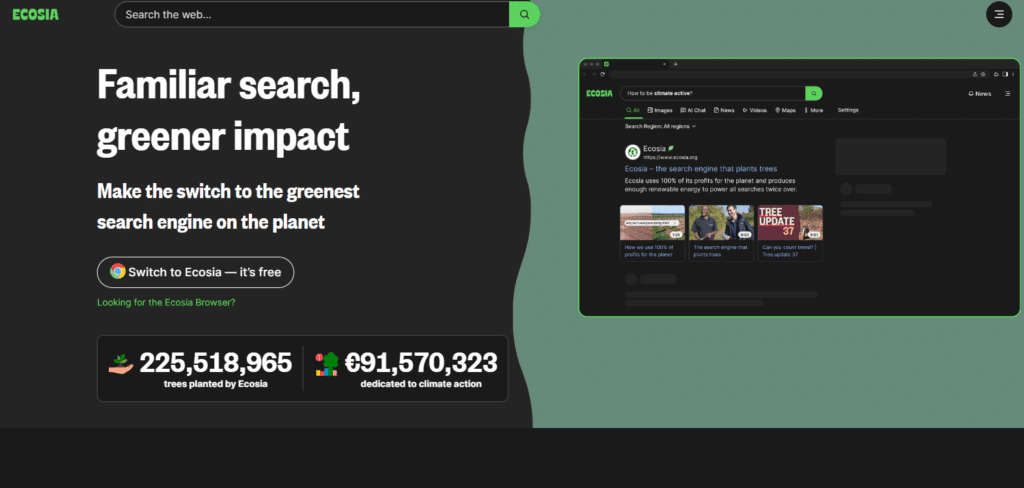
Key Features
- Transparent Impact: Monthly financial and impact reports show exactly how revenue is used for tree planting projects.
- Eco-Friendly Operations: Ecosia’s servers run on renewable energy, reducing its carbon footprint.
- Privacy-First Approach: Like other privacy-focused engines, Ecosia does not store personal data or use third-party trackers.
- Simple, Clean Interface: The design is user-friendly and optimized for both desktop and mobile browsing.
Pros and Cons
| Pros | Cons |
| Every search contributes to tree planting | Uses Bing’s search index, which may not be as refined as Google’s |
| Transparent and ethical financial practices | Can sometimes be slower for complex queries |
| Environmentally friendly and carbon neutral | Lacks advanced search operators found in other engines |
Best For
Ecosia is best for users who want to contribute to environmental conservation while searching. It’s perfect for educators, eco-conscious individuals, and nonprofits who value sustainability.
6. Qwant: Europe’s Privacy Shield
Overview
Qwant, a search engine based in France, has built its reputation on respecting user privacy and complying with strict European data protection regulations (GDPR). Qwant does not track user activity, making it a trusted choice for those who want to keep their browsing habits confidential. Additionally, it offers a variety of specialized search options, including dedicated sections for news and music.

Key Features
- Strict Privacy Policies: Qwant does not store search history or personal data, ensuring complete anonymity.
- GDPR Compliance: Fully adheres to European data protection laws, offering an added layer of legal security.
- Dedicated Media Sections: Separate tabs for news and music help users discover content beyond standard search results.
- Family-Friendly Interface: Qwant Junior is a kid-safe version that filters explicit content, making it ideal for families.
Pros and Cons
| Pros | Cons |
| Strong emphasis on user privacy and data protection | Limited global reach compared to Google |
| Family-friendly features with dedicated kid-safe options | Interface can feel clunky and outdated |
| Tailored results for European users | Smaller index may miss niche international content |
Best For
Qwant is ideal for European users, families, and anyone looking to navigate the web without the concerns of tracking. Its focus on privacy and regional relevance makes it a standout choice for users in the EU.
7. Yandex: Russia’s Search Powerhouse
Overview
Yandex dominates the search landscape in Russia and several Eastern European countries. Its algorithms are optimized for Cyrillic content, making it an indispensable tool for Russian-speaking users. Yandex offers a comprehensive suite of services—ranging from email and maps to music streaming—creating an ecosystem that rivals Google in its region.
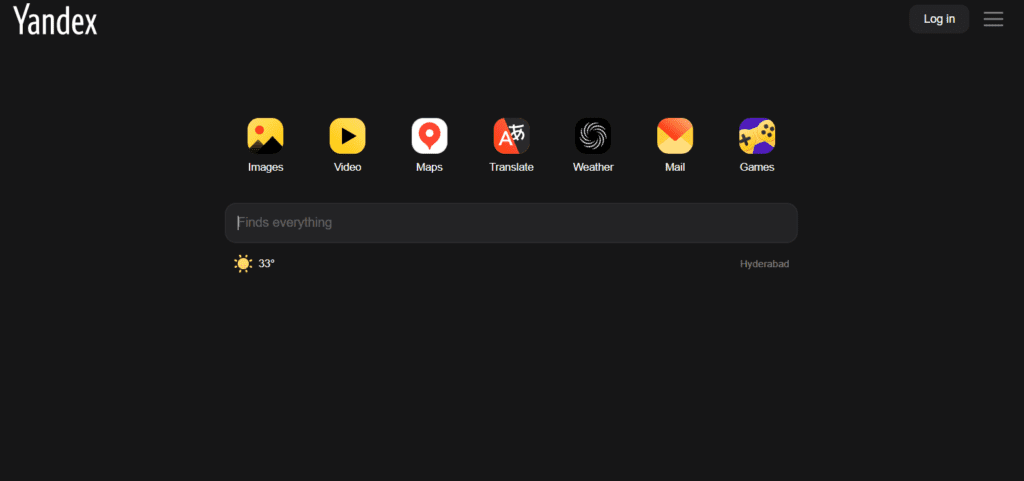
Key Features
- Localized Search: Yandex excels at delivering search results that are culturally and linguistically tailored for Russian and Eastern European users.
- AI-Powered Innovations: Advanced natural language processing helps understand conversational queries, particularly in Russian.
- Integrated Services: Beyond search, Yandex offers maps, email, translation services, and even taxi-hailing, providing an all-in-one platform.
- Voice and Image Recognition: Cutting-edge features include voice search and robust image recognition capabilities.
Pros and Cons
| Pros | Cons |
| Highly optimized for Russian and Eastern European content | Privacy concerns due to data sharing and regional policies |
| Comprehensive suite of integrated services | Limited functionality for non-Russian speakers |
| Advanced AI-driven search and voice recognition | Many features are region-specific and may not be available globally |
Best For
Yandex is best suited for Russian speakers, Eastern European businesses, and travelers in the region. If you require search results in Cyrillic or need access to localized services, Yandex stands out as a robust alternative.
8. Swisscows: Family-Safe & Privacy-Focused
Overview
Swisscows is a unique search engine that combines a strict no-tracking policy with a focus on family-friendly content. With servers based in Switzerland—renowned for its strong privacy laws—Swisscows employs semantic search technology to understand the context behind your queries rather than just matching keywords. This focus on understanding intent makes it particularly useful for educational purposes and safe browsing for children.
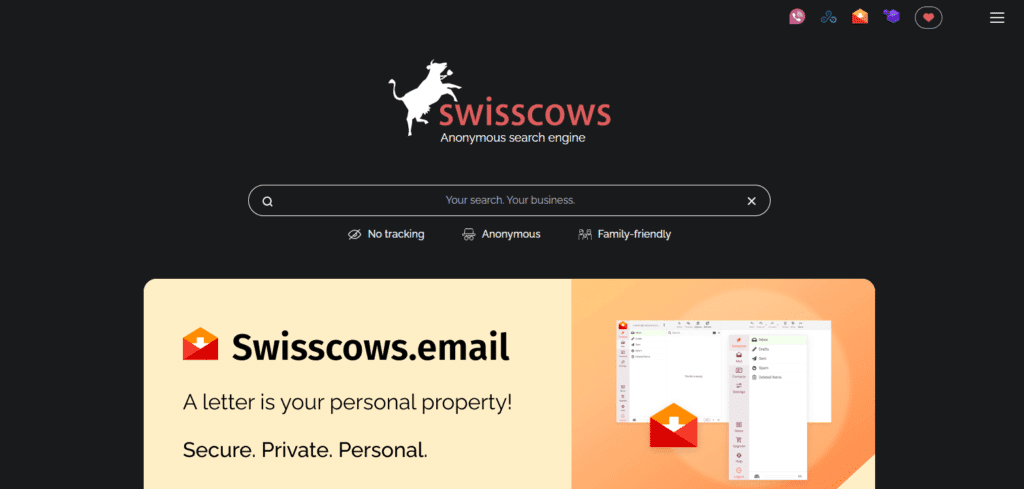
Key Features
- No Tracking: Swisscows does not store user data, providing a secure browsing experience.
- Content Filtering: Built-in filters block explicit content, ensuring that search results are appropriate for all ages.
- Semantic Search: Uses context-based search algorithms to deliver results that match user intent, rather than relying solely on keywords.
- Ad-Free Experience: The engine is free from distracting ads, offering a clean and streamlined interface.
Pros and Cons
| Pros | Cons |
| Excellent for family and educational use | Smaller search index compared to giants like Google |
| Strict privacy policies with no data logging | Interface can appear basic and outdated |
| Semantic search offers contextually relevant results | Updates and new content can be slower to index |
Best For
Swisscows is ideal for parents, schools, and users who prioritize a safe and private browsing experience. Its family-friendly filters make it a great tool for ensuring that young users are protected online.
9. Mojeek: The Fully Independent Search Engine
Overview
Mojeek stands apart from many competitors by using its own web crawler and maintaining an independent search index. Unlike most alternatives that rely on the indices of Google or Bing, Mojeek offers a truly unbiased search experience. Its commitment to neutrality means you won’t see sponsored links or targeted results influenced by your previous searches.
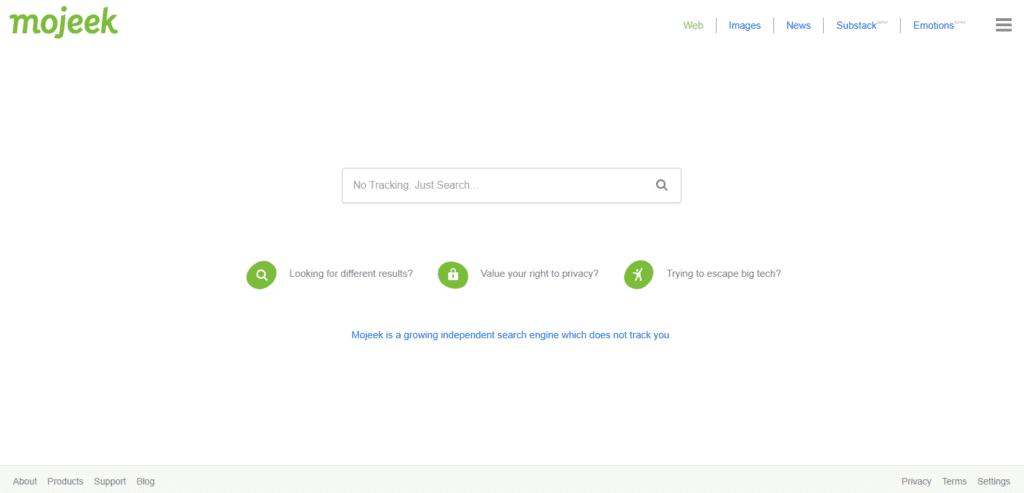
Key Features
- Independent Indexing: Mojeek’s proprietary crawler builds its own database of web pages, ensuring that its results are not filtered through third-party biases.
- No Ads or Tracking: With a strict no-tracking policy, Mojeek offers ad-free search results without compromising user privacy.
- Transparency in Crawling: Mojeek is open about its indexing process, giving users insight into how search results are gathered and ranked.
- Focus on Unbiased Results: The search engine prides itself on delivering neutral results, free from the influences of major tech algorithms.
Pros and Cons
| Pros | Cons |
| Completely independent search index | Smaller database and index compared to Google |
| No ads, tracking, or sponsored links | Lacks many advanced search features (e.g., image or video search) |
| Transparent crawling process | Slower growth of its index may affect comprehensiveness |
Best For
Mojeek is perfect for researchers, tech minimalists, and users who are passionate about unbiased, independent search. It appeals to those who want to avoid the corporate influence of larger search engines and prefer a more open, transparent approach.
10. Searx: The Open-Source Metasearch Engine
Overview
Searx is a versatile, open-source metasearch engine that aggregates results from over 70 different search providers. What makes Searx unique is its commitment to user privacy—by not tracking queries or storing data, it gives you total control over your search experience. Additionally, because it’s open source, users can even host their own instance and customize the interface and functionality to suit their needs.

Key Features
- Customizable & Open Source: With full access to its code, developers can modify Searx or even self-host their own instance.
- Multi-Source Aggregation: Combines results from several search engines, providing a balanced perspective that leverages the strengths of each.
- No Logs and No Tracking: Strict privacy policies mean that Searx does not record your IP address, queries, or clicks.
- Community-Driven Development: An active community supports and continuously improves the engine through contributions on GitHub.
Pros and Cons
| Pros | Cons |
| Highly customizable and open source | Requires technical expertise for self-hosting |
| Aggregates results from multiple sources | Can be slower than single-engine searches |
| Strong commitment to privacy with no logs | Default UI may feel unpolished without customization |
Best For
Searx is best suited for developers, privacy advocates, and open-source enthusiasts. If you’re technically inclined or simply want a search engine that provides aggregated, unbiased results, Searx offers an adaptable platform.
The Ultimate Search Engine Comparison Table
To help you make an informed decision, here’s a quick-reference table comparing all 10 search engines based on key criteria:
| Search Engine | Privacy | Eco-Friendly | Rewards | Regional Focus | Family Safety |
| DuckDuckGo | ✅ | ❌ | ❌ | ❌ | ❌ |
| Bing | ❌ | ❌ | ✅ | ❌ | ❌ |
| Brave Search | ✅ | ❌ | ❌ | ❌ | ❌ |
| Startpage | ✅ | ❌ | ❌ | ❌ | ❌ |
| Ecosia | ✅ | ✅ | ❌ | ❌ | ❌ |
| Qwant | ✅ | ❌ | ❌ | ✅ (Europe) | ✅ |
| Yandex | ❌ | ❌ | ❌ | ✅ (Russia/East EU) | ❌ |
| Swisscows | ✅ | ❌ | ❌ | ❌ | ✅ |
| Mojeek | ✅ | ❌ | ❌ | ❌ | ❌ |
| Searx | ✅ | ❌ | ❌ | ❌ | ❌ |
Legend: ✅ = Strong Suit | ❌ = Not a Focus
Final Thoughts: Why Settle for One-Size-Fits-All?
Google’s convenience is undeniable, but it comes at a cost—personal data tracking, targeted advertising, and algorithmic biases. Each alternative search engine we’ve explored in this guide offers a unique perspective on how you can navigate the web differently. Here are some key takeaways to consider:
Your Privacy Matters
For those who prioritize privacy above all else, DuckDuckGo, Startpage, and Brave Search offer robust solutions that let you browse without leaving a digital footprint. Mojeek and Searx further emphasize unbiased, ad-free experiences that ensure you remain in control of your personal information.
Ethics and Environmental Impact
If your values extend beyond personal privacy to include global ethics, Ecosia is a standout option. Every search contributes to reforestation, turning your daily browsing into a force for environmental good. It’s a reminder that even the smallest actions can make a significant impact when aggregated over millions of users.
Specialized Experiences for Regional and Family Needs
For users in Europe, particularly those concerned about U.S.-based data policies, Qwant offers a tailored experience that adheres to stringent GDPR standards. Meanwhile, Yandex caters specifically to Russian speakers and Eastern European users, providing culturally relevant results. Families and educators will appreciate Swisscows for its commitment to safe, filtered content that ensures a worry-free browsing experience.
Innovation and Independence
Brave Search, Mojeek, and Searx embody innovation. Brave Search is building its own index, challenging traditional search paradigms, while Mojeek’s independent crawler ensures that its results aren’t biased by the corporate interests of larger tech companies. Searx’s open-source nature offers flexibility and customization—a playground for developers and privacy purists alike.
The Bottom Line
Your search engine should reflect your priorities. It’s not just about getting the right answer—it’s about how that answer is delivered and the values it represents. Whether you’re looking for total anonymity, environmental impact, or a regional focus, there’s an alternative out there that aligns with your beliefs. Experiment with these options, and you might find that your browsing experience becomes not only more secure but also more aligned with your ethical and personal priorities.
Call to Action
Take a moment to try out one of these alternatives. Spend a week browsing with DuckDuckGo if privacy is paramount, or switch to Ecosia to make every search count toward reforestation. Share your experience with friends and family—help spread the word about a more ethical, diversified web experience.
Remember, the internet is vast, and no single search engine can capture every nuance of its content. Embracing multiple search engines can provide a more balanced, nuanced perspective on the world. After all, the best tool isn’t always the biggest; it’s the one that fits your personal values and needs.
Conclusion
Google may be the giant that started it all, but the landscape of search is evolving. Today’s search engines offer everything from advanced privacy features and ad-free experiences to eco-friendly initiatives and culturally tailored content. By understanding the strengths and weaknesses of each option—DuckDuckGo’s uncompromising privacy, Bing’s rewards program, Brave Search’s independence, Startpage’s anonymized Google results, Ecosia’s environmental mission, Qwant’s European compliance, Yandex’s regional expertise, Swisscows’ family safety, Mojeek’s unbiased crawling, and Searx’s open-source customization—you can break free from the one-size-fits-all approach of traditional search.
So, which search engine will you try first? The choice is yours. Embrace the diversity of the web, explore its vast resources, and ensure that your digital footprint aligns with your values. The future of search is in your hands—choose wisely, and let your online journey reflect who you are.
Happy Searching!

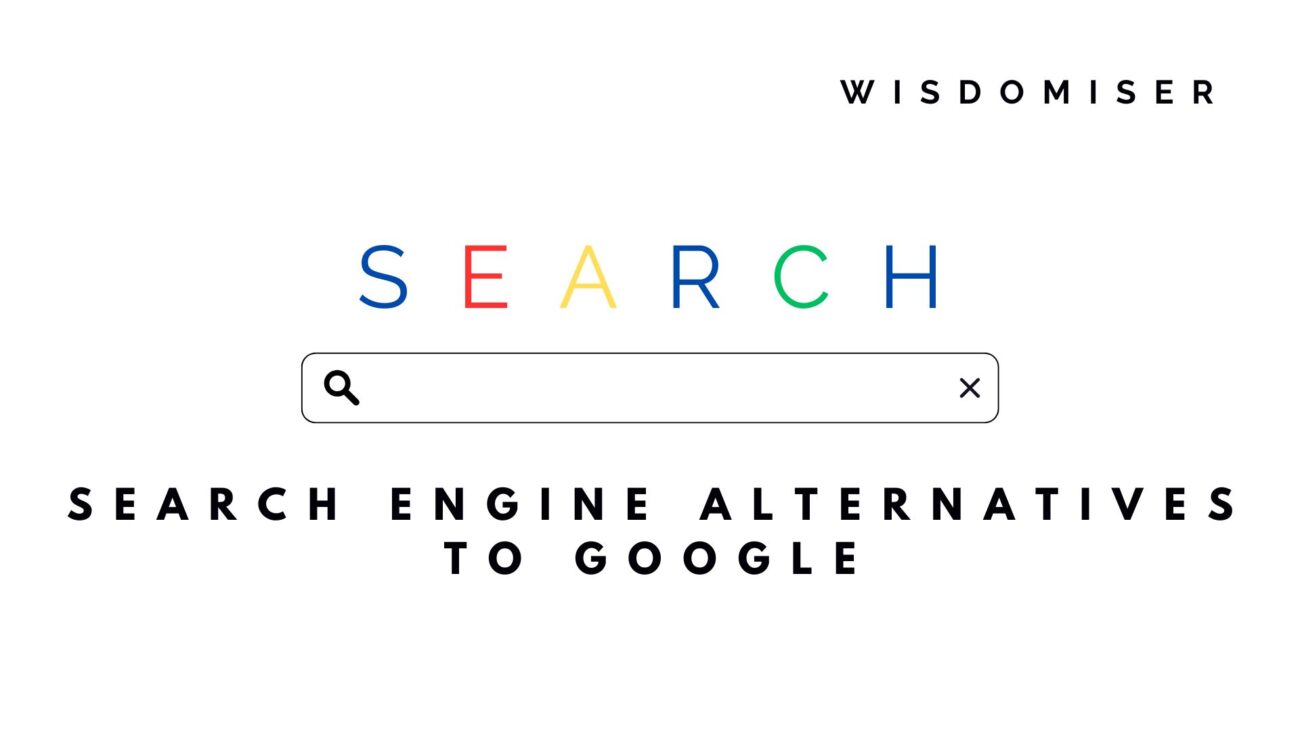
One thought on “Search Engine Alternatives to Google: Exploring the Best Options”